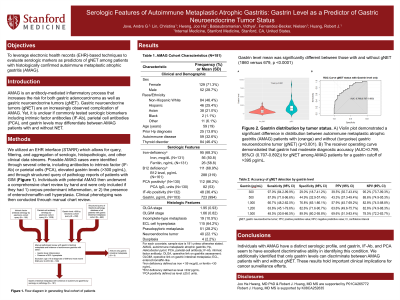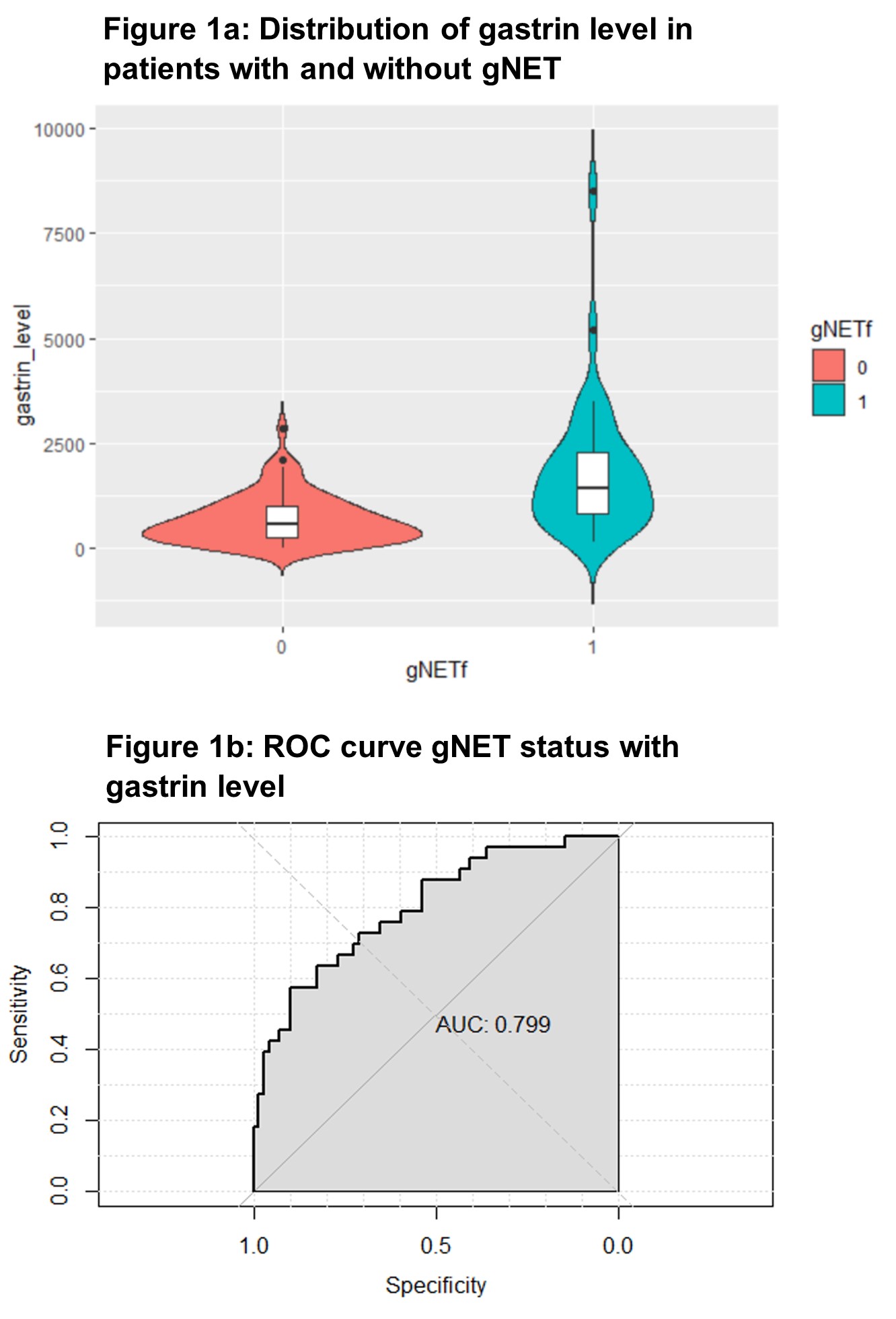Sunday Poster Session
Category: Stomach
P1619 - Serologic Features of Autoimmune Metaplastic Atrophic Gastritis: Gastrin Level as a Predictor of Gastric Neuroendocrine Tumor Status
Sunday, October 27, 2024
3:30 PM - 7:00 PM ET
Location: Exhibit Hall E

Has Audio

Andre G. Jove, MD
Stanford Health Care
Menlo Park, CA
Presenting Author(s)
Andre G. Jove, MD1, Christina Lin, MD2, Joo Ha Hwang, MD, PhD2, Vidhya Balasubramanian, MS2, Nielsen Fernandez-Becker, MD, PhD2, Robert Huang, MD3
1Stanford Health Care, Menlo Park, CA; 2Stanford Health Care, Stanford, CA; 3Stanford University School of Medicine, Stanford, CA
Introduction: Gastric neuroendocrine tumors (gNET) are an increasingly observed complication of autoimmune metaplastic atrophic gastritis (AMAG). Yet, it is unclear if commonly tested serologic biomarkers including intrinsic factor antibodies (IF-Ab), parietal cell antibodies (PCA), and gastrin levels may differentiate between AMAG patients with and without NET. We leveraged electronic health records (EHR)-based techniques to evaluate serologic markers as predictors of gNET among patients with histologically confirmed AMAG.
Methods: This study was conducted at Stanford University under IRB approval. We utilized an EHR interface (STARR) and other clinical data streams to identify possible AMAG cases through several criteria, including IF-A, PCA, elevated gastrin levels ( >300 pg/mL), and structured query of pathology reports. Individuals with potential AMAG underwent a comprehensive chart review and were included in the cohort if they had 1) gastric-predominant inflammation, or 2) the presence of enterochromaffin-cell hyperplasia. Clinical phenotyping was then conducted through manual chart review and statistical analysis was conducted using R (version 4.0).
Results: The final analytic cohort comprised 181 individuals, with serologic characteristics depicted in Table 1. When analyzing serologic markers, 86% demonstrated positivity by PCA, 36% by IF-Ab, and 94% by gastrin. gNET were present in 22% of patients. In comparing serologic markers between those with gNET and those without, no significant difference was observed between the cohorts for IF-Ab and PCA; however, the mean gastrin level was significantly higher among those with gNET (1860 versus 679 pg/mL, p 0.0003) as depicted in the distribution plot (Figure 1a). Receiver operating curve analysis revealed that gastrin levels demonstrated moderate-to-high discrimination for identifying AMAG patients with gNET (c=0.799, Figure 1b).
Discussion: Individuals with AMAG have a distinct serologic profile, and that gastrin, IF-Ab, and PCA seem to have excellent discriminative ability in identifying this condition. We additionally identified that only gastrin levels can discriminate between AMAG patients with and without gNET. These results hold important clinical implications for cancer surveillance efforts.

Note: The table for this abstract can be viewed in the ePoster Gallery section of the ACG 2024 ePoster Site or in The American Journal of Gastroenterology's abstract supplement issue, both of which will be available starting October 27, 2024.
Disclosures:
Andre G. Jove, MD1, Christina Lin, MD2, Joo Ha Hwang, MD, PhD2, Vidhya Balasubramanian, MS2, Nielsen Fernandez-Becker, MD, PhD2, Robert Huang, MD3. P1619 - Serologic Features of Autoimmune Metaplastic Atrophic Gastritis: Gastrin Level as a Predictor of Gastric Neuroendocrine Tumor Status, ACG 2024 Annual Scientific Meeting Abstracts. Philadelphia, PA: American College of Gastroenterology.
1Stanford Health Care, Menlo Park, CA; 2Stanford Health Care, Stanford, CA; 3Stanford University School of Medicine, Stanford, CA
Introduction: Gastric neuroendocrine tumors (gNET) are an increasingly observed complication of autoimmune metaplastic atrophic gastritis (AMAG). Yet, it is unclear if commonly tested serologic biomarkers including intrinsic factor antibodies (IF-Ab), parietal cell antibodies (PCA), and gastrin levels may differentiate between AMAG patients with and without NET. We leveraged electronic health records (EHR)-based techniques to evaluate serologic markers as predictors of gNET among patients with histologically confirmed AMAG.
Methods: This study was conducted at Stanford University under IRB approval. We utilized an EHR interface (STARR) and other clinical data streams to identify possible AMAG cases through several criteria, including IF-A, PCA, elevated gastrin levels ( >300 pg/mL), and structured query of pathology reports. Individuals with potential AMAG underwent a comprehensive chart review and were included in the cohort if they had 1) gastric-predominant inflammation, or 2) the presence of enterochromaffin-cell hyperplasia. Clinical phenotyping was then conducted through manual chart review and statistical analysis was conducted using R (version 4.0).
Results: The final analytic cohort comprised 181 individuals, with serologic characteristics depicted in Table 1. When analyzing serologic markers, 86% demonstrated positivity by PCA, 36% by IF-Ab, and 94% by gastrin. gNET were present in 22% of patients. In comparing serologic markers between those with gNET and those without, no significant difference was observed between the cohorts for IF-Ab and PCA; however, the mean gastrin level was significantly higher among those with gNET (1860 versus 679 pg/mL, p 0.0003) as depicted in the distribution plot (Figure 1a). Receiver operating curve analysis revealed that gastrin levels demonstrated moderate-to-high discrimination for identifying AMAG patients with gNET (c=0.799, Figure 1b).
Discussion: Individuals with AMAG have a distinct serologic profile, and that gastrin, IF-Ab, and PCA seem to have excellent discriminative ability in identifying this condition. We additionally identified that only gastrin levels can discriminate between AMAG patients with and without gNET. These results hold important clinical implications for cancer surveillance efforts.

Figure: Figure 1a. Among those who were negative for gNET (gNETf = 0), the gastrin levels were largely concentrated under 1800, while amongst those positive for gNET (gNETf = 1), there was a wider range of values.
Figure 1b. The area under the curve was 0.799 (moderate accuracy), which means there was an 80% probability of identifying a correct true positive gNET status by gastrin level in GIM patients than GIM patients with negative gNET status.
Figure 1b. The area under the curve was 0.799 (moderate accuracy), which means there was an 80% probability of identifying a correct true positive gNET status by gastrin level in GIM patients than GIM patients with negative gNET status.
Note: The table for this abstract can be viewed in the ePoster Gallery section of the ACG 2024 ePoster Site or in The American Journal of Gastroenterology's abstract supplement issue, both of which will be available starting October 27, 2024.
Disclosures:
Andre Jove indicated no relevant financial relationships.
Christina Lin indicated no relevant financial relationships.
Joo Ha Hwang indicated no relevant financial relationships.
Vidhya Balasubramanian indicated no relevant financial relationships.
Nielsen Fernandez-Becker indicated no relevant financial relationships.
Robert Huang indicated no relevant financial relationships.
Andre G. Jove, MD1, Christina Lin, MD2, Joo Ha Hwang, MD, PhD2, Vidhya Balasubramanian, MS2, Nielsen Fernandez-Becker, MD, PhD2, Robert Huang, MD3. P1619 - Serologic Features of Autoimmune Metaplastic Atrophic Gastritis: Gastrin Level as a Predictor of Gastric Neuroendocrine Tumor Status, ACG 2024 Annual Scientific Meeting Abstracts. Philadelphia, PA: American College of Gastroenterology.
